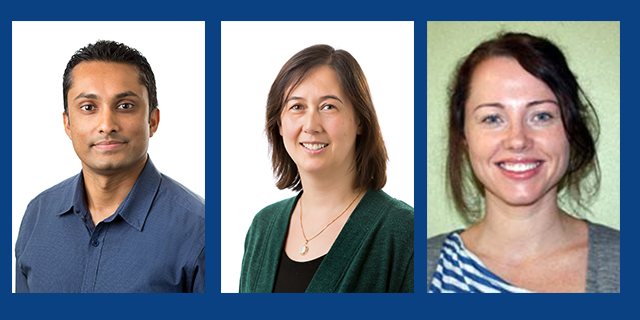Congratulations to our NHMRC grant awardees
A life coaching pilot in Victorian Indigenous communities, and better identification of suicide hotspots are among six MSPGH research projects to receive funding in the August 2018 round of National Health and Medical Research Council grants.

L-R: Gayan Bowatte, Jennifer Perrit and Caroline van Gemert, from the Centre for Epidemiology and Biostatistics
Head of School, Professor Terry Nolan, said: “These grants highlight the strength of our leadership in growing Australia’s Indigenous health research capacity, under professors Sandra Eades and Kerry Arabena; as well as our strengths in mental health, sexual health and allergy and lung health.
"I’m looking forward to seeing this research inform policy and clinical practice.”
The recipients are:
Professor Kerry Arabena
Targeted Call for research into Indigenous Social and Emotional Wellbeing
Project
Responding to Aboriginal and Torres Strait Islander Family Aspirations to Foster Self-Determination and Social and Emotional Wellbeing
Details
An Indigenous co-designed life-coaching pilot program showed significant success in engaging young parents and their children and achieving their short and medium-term goals and improving their health and social, emotional, spiritual and cultural wellbeing (SEWB). The proposed Indigenous-led project evaluates the impact of scaling up a family commissioned life-coaching service on the SEWB of Indigenous families living in Mornington Peninsula, Healesville and northern metropolitan Melbourne.
Dr Lay San Too
Public Health (Australia) Early Career Fellowship
Project
A novel and systematic approach to better identify and characterise suicide hotspots
Details
Three strategies have been shown to successfully prevent suicides at suicide hotspots. However, rigorous statistical methods are yet to be used to identify and characterise suicide hotspots to marshal suicide prevention efforts. This project will use a novel and systematic approach to address this issue. The findings will be directly translatable to policy and practice, and will have significant implications for suicide prevention worldwide.
Mr Karl Andriessen
Public Health (Australia) Early Career Fellowship
Project
Development of an intervention for bereaved adolescents to facilitate the grief process and to prevent mental health ramifications.
Details
The project will develop an intervention for bereaved adolescents in Australia. It will determine the current knowledge of the effectiveness of adolescent bereavement support, develop a pilot intervention based on recommendations from adolescents, parents and clinicians, and test its acceptability and effects. As such, the intervention will be based on evidence from the literature, and the needs of adolescents. It will be safe and effective for this vulnerable population.
Dr Gayan Bowatte
Public Health (Australia) Early Career Fellowship
Project
Effects of long-term air pollution and risk of asthma, chronic obstructive pulmonary disease and lung cancer.
Details
Air pollution is a known risk factor for poor lung health. However, it is not clear how long-term exposures impact lung health in different levels of pollution: low, moderate and high. Also, urban vegetation may be beneficial to our health by improving air quality and encouraging physical activity, but this evidence is limited. Gayan's research aims to investigate long-term exposures to air pollution on human health and how a green environment and physical activity can lessen any such harm.
Dr Jennifer Perret
Australian Clinical Research Early Career Fellowship
Project
Development of a comprehensive model for chronic obstructive pulmonary disease (COPD) prediction at an early stage
Details
Chronic obstructive pulmonary disease (COPD) is a major global health problem with high mortality and few effective treatments. To reduce this burden, Jennifer will quantify existing and newly identified COPD risk factors, and integrate them into a comprehensive risk prediction model. By converting this knowledge into a web-based tool, which she will evaluate in primary-care settings, identifying at-risk individuals at an early stage offers an innovative strategy to improve COPD outcomes.
Ms Caroline van Gemert
Public Health (Australia) Early Career Fellowship
Project
Development of an electronic general practice tool to improve prevention and control of sexually transmitted infections and blood borne viruses among priority populations
Details
Some population groups have higher rates of sexually transmitted infections (STIs) and blood borne viruses (BBVs) than the general population, including men who have sex with men, people who inject drugs and sex workers (“priority populations”). Caroline will develop novel methods to improve the identification of priority populations in general practice. Her research will lead to improved management of STIs and BBVs among priority populations.